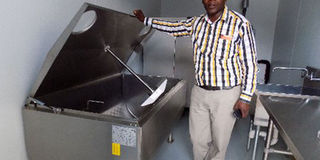All I need to cool my milk is the sun

Willy Kirwa with his solar milk cooler in Eldoret. PHOTO|RACHEL KIBUI|NATION
What you need to know:
- Willens Dairy Farm, owned by farmer Willy Kirwa, about 10km from Eldoret Town is a marvel.
- There are many lessons to pick from this model farm, starting at the training centre and the construction of the dairy shed subdivided for his 51 animals that he has categorised as high-yielders, low yielders and dry cows.
- The farmer uses a solar-powered milk cooler that helps him save good amount of money, thus ending up with a higher profit.
- It cost him about Sh5 million to buy and mount the system, with the cost being inclusive of transport and installation.
- He gets between Sh2-Sh3 higher per litre of milk from New Kenya Cooperative Creameries because his milk is considered of high quality due the solar cooling value addition.
Willens Dairy Farm, owned by farmer Willy Kirwa, about 10km from Eldoret Town is a marvel.
As you enter the farm, the first things one comes across is a building labelled Willens Practical Training Centre, and a board with the slogan, “Happy Cow, Happy Farmer”.
The catchphrase gives one an indication that this is not an ordinary dairy farm.
On this day, some 50 dairy farmers from the Kabiyet Dairies Cooperative Society had travelled from the neighbouring Nandi County to the farm in Uasin Gishu for lessons.
Lessons to pick from the farm
There are many lessons to pick from this model farm, starting at the training centre and the construction of the dairy shed subdivided for his 51 animals that he has categorised as high-yielders, low yielders and dry cows.
But what caught the attention of many farmers was a solar-powered milk cooler, one of a kind that helps him save good amount of money, thus ending up with a higher profit.
From a distance, one may easily mistake the milk cooling plant for a container, like the one used to transport goods.
“I imported the system from the US after learning about it on the internet,” says Kirwa, adding, “I actually went there for the whole of it except the container and a few other things that were available locally.”
It cost him about Sh5 million to buy and mount the system, with the cost being inclusive of transport and installation.
“The electric-powered cooler would have cost me about half the amount but I have no regret because at the end of it the machine would have turned out expensive because of the high electricity bills.”
On average, he estimates he would be incurring power bills to the tune of about Sh60,000 every month.
“When I look at this cooler and imagine how much I save, I thank God that I made that decision. I consider buying this solar-powered cooler a smart business decision.”
Solar cooling value addition
But the savings he makes in power bills are not the only benefits, he gets between Sh2-Sh3 higher per litre of milk from New Kenya Cooperative Creameries because his milk is considered of high quality due the solar cooling value addition.
Inside the cooler there is a semi-cylindrical stainless steel tank and adjacent to is an ice-box. There are pipes from the stainless steel ice box, which flow the semi-frozen water around the tank to cool the milk.
The cooler has a capacity to hold 600 litres at any given time, while his current production is 500 litres from the 25 cows that are lactating.
The cooler runs at between 3.7-4 degrees centigrade, and Kirwa says he stores the milk for between three-four days.
His main clients are neighbouring schools as they buy milk in bulk at Sh50, against New KCC’s average of Sh35.
He has retained the New KCC market because that is where he channels his produce when schools are not in session.
To ensure maximum cleanliness and minimise chances of contamination, very few people are allowed into the cooler, especially when it is loaded with milk.
“I also keep the cooling tank clean all the times,” he says.
Isn’t Kirwa worried about the days when there is literally no sunshine?
“No,” he says. Apparently, the solar panels save power and can reserve energy for up to three days.
Besides, they just need minimal sunshine to recharge and the area rarely goes for a day without the energy.
“I could not find the machine locally, but I believe it can be made if you get a good fabricator after importing some parts.”
Kirwa says he plans to start value addition by manufacturing yoghurt and other dairy products right at his farm.
Christine Misiko, who heads the European Union funded Standards and Market Access Programme in Kenya, says use of technology will help farmers get best prices.
She adds that with practices that enhance hygiene and preservation, Kenyan dairy products have great chances to access the international markets.





